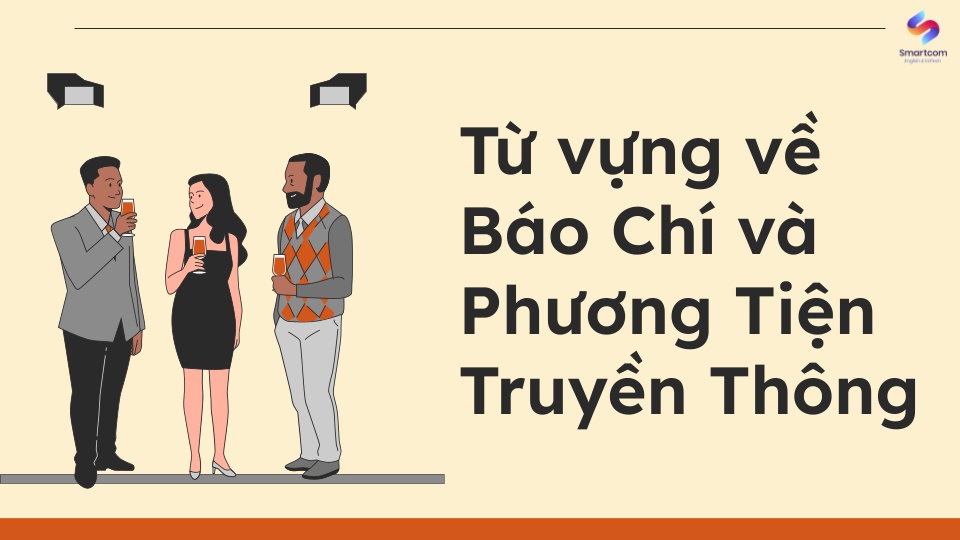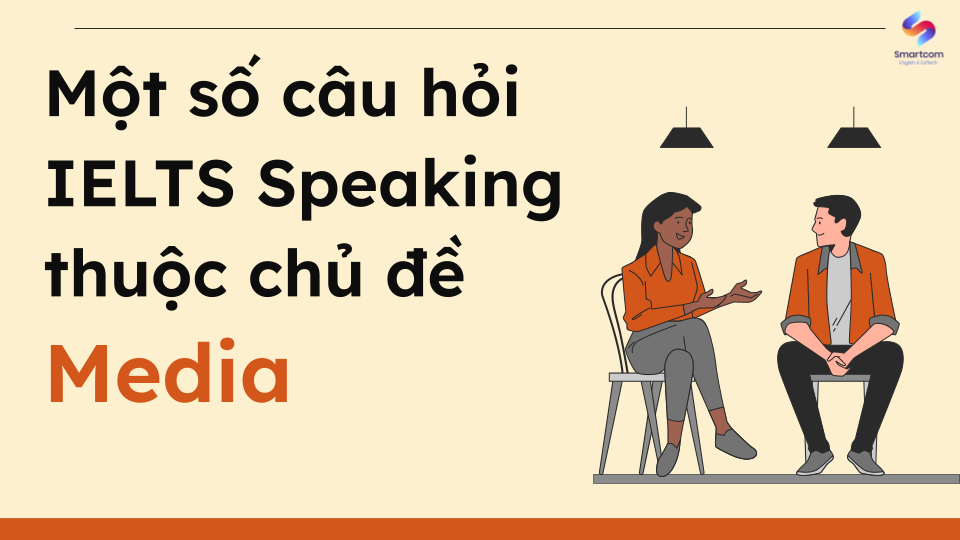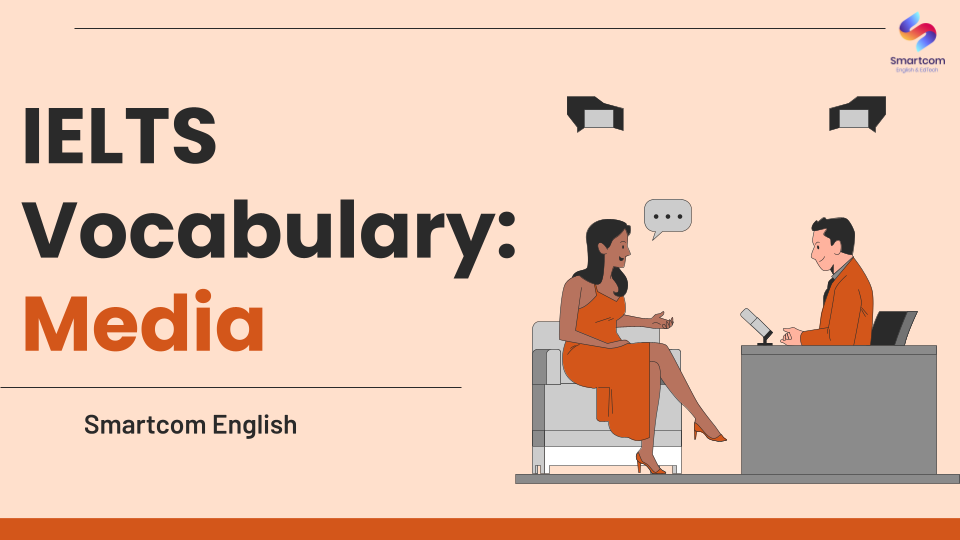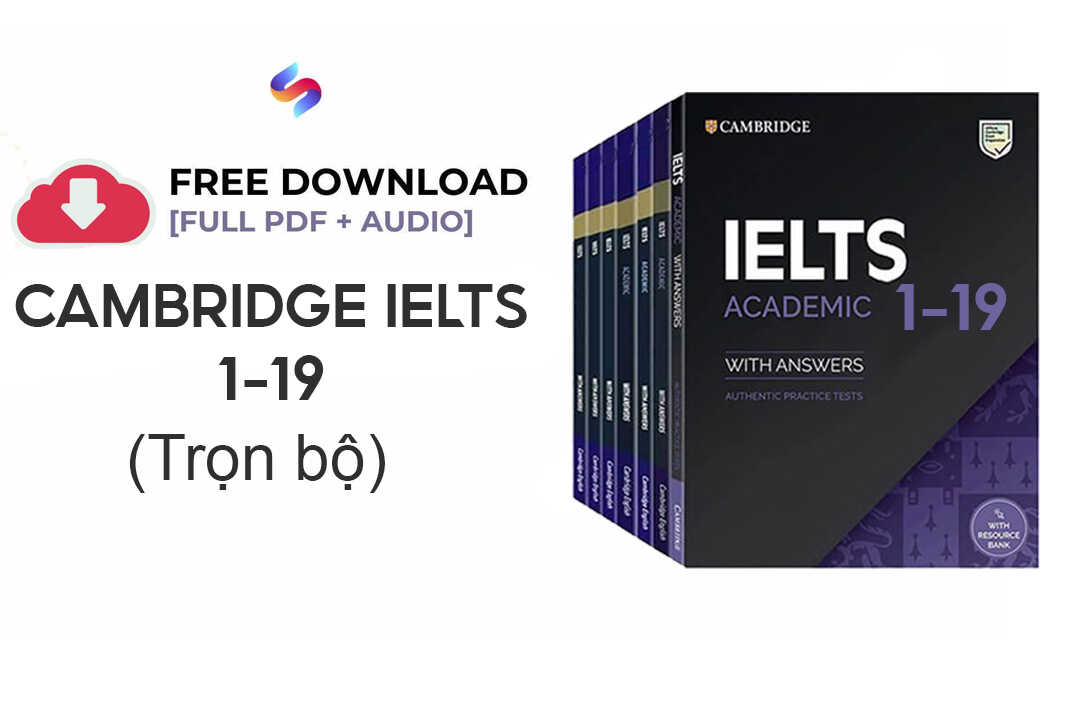Đội ngũ chuyên gia tại Smartcom English là tập hợp những chuyên gia đầu ngành trong lĩnh vực IELTS nói riêng và tiếng Anh nói chung. Với phương pháp giảng dạy sáng tạo, kết hợp với công nghệ AI, chúng tôi mang đến những trải nghiệm học tập độc đáo và hiệu quả. Mục tiêu lớn nhất của Smartcom Team là xây dựng một thế hệ trẻ tự tin, làm chủ ngôn ngữ và sẵn sàng vươn ra thế giới.
Trong hành trình ôn thi, việc nắm chắc về từ vựng không chỉ là chìa khóa mở cánh cửa cho vốn ngôn ngữ phong phú, mà còn giúp bạn tự tin hơn khi làm các bài kiểm tra IELTS, đặc biệt là trong 2 kĩ năng Viết và Nói. Hôm nay, chúng ta sẽ tập trung vào chủ đề IELTS Vocabulary chủ đề Media, một lĩnh vực quan trọng và thường xuyên xuất hiện trong các đề thi.
Từ vựng IELTS Vocabulary chủ đề Media (Phương tiện truyền thông)

Từ vựng về các loại hình báo chí và phương tiện truyền thông
- Blog /blɒɡ/: trang web chứa các ý kiến cá nhân
- Social media /ˈsəʊʃəl ˈmiːdiə/: Phương tiện truyền thông mạng xã hội
- Mass media /mæs ˈmiːdiə/: Phương tiện thông tin đại chúng
- Mainstream media /ˈmeɪnstriːm ˈmiːdiə/: Phương tiện truyền thông chính thống
- Broadsheet /ˈbrɔːdʃiːt/: Báo khổ lớn
- Tabloid /ˈtæblɔɪd/: Báo lá cải
- The daily /ðə ˈdeɪli/: Báo phát hành hàng ngày
- Bulletin /ˈbʊlətɪn/: Bản tin thời sự trên truyền hình
- Compact /kəmˈpækt/: Tờ báo ngắn đưa những tin tức chính luận
- Online news /ˈɒnlaɪn njuːz/: Tin tức trực tuyến
- Heavy /ˈhevi/: Báo chính luận
- Investigative journalism /ɪnˈvɛstɪˌɡeɪtɪv ˈdʒɜːrnəlɪzəm/: Báo nghiên cứu chi tiết về một vấn đề hoặc sự kiện
Từ vựng về nghề nghiệp liên quan đến phương tiện truyền thông
- News anchor /nuz ˈæŋ.kər/: Người dẫn chương trình, người đọc tin
- Media baron /ˈmiː.di.ə ˈbær.ən/: Ông trùm truyền thông
- Whistle-blower /ˈwɪs.əlˌbloʊ.ər/: Người tiết lộ thông tin nổi bật
- Censorship /ˈsen.sər.ʃɪp/: Sự kiểm duyệt thông tin
- Journalist /ˈdʒɜːrnəlɪst/: Nhà báo
- Reporter /rɪˈpɔːtər/: Phóng viên
- Editor /ˈedɪtər/: Biên tập viên
- Copywriter /ˈkɒpɪraɪtər/: Người viết quảng cáo
- Broadcaster /ˈbrɔːdkɑːstər/: Nhà phát thanh, người làm truyền hình
- Columnist /ˈkɒləmnɪst/: Nhà bình luận
- Photographer /fəˈtɒɡrəfər/: Nhiếp ảnh gia
- Videographer /ˌvɪdiˈɒɡrəfər/: Người quay video
- Social Media Manager /ˈsəʊʃəl ˈmiːdiə ˈmænɪdʒər/: Quản lý truyền thông xã hội
- Content Creator /ˈkɒntent kriˈeɪtər/: Người tạo nội dung
- Public Relations Specialist /ˈpʌblɪk rɪˈleɪʃənz ˈspeʃəlɪst/: Chuyên viên quan hệ công chúng
- Graphic Designer /ˈɡræfɪk dɪˈzaɪnər/: Nhà thiết kế đồ họa
- Web Developer /wɛb dɪˈvɛləpər/: Nhà phát triển web
Các cụm từ Collocation về Media (Phương tiện Truyền thông)
- Primetime television: thời điểm mọi người đều xem TV
Ví dụ: During primetime television, people often gather to watch their favorite shows, creating a shared viewing experience.
- The electronic media: truyền thông điện tử
Ví dụ: The electronic media has transformed the way we receive and engage with information.
- To catch the latest scoop: nắm bắt tin tức sốt dẻo
Ví dụ: Did you stay up late to catch the latest scoop on the breaking news?
- Media ethics: đạo đức truyền thông
Ví dụ: Ensuring media ethics is essential for maintaining trust and reliability in journalism.
- To publish an article: đăng tải bài viết
Ví dụ: She was excited when she got the opportunity to publish her article in the local newspaper.
- Press conference: cuộc họp báo
Ví dụ: They organized a press conference to address the recent developments.
Một số câu hỏi Speaking thuộc chủ đề Media mà bạn có thể tham khảo

Speaking Part 1
Where do you usually get the news from?
I get all my news online, mainly from my local newspaper’s website, which I check daily. For international updates, I turn to VnExpress, particularly world news and technology. I’m a news enthusiast and can’t go a day without staying informed.
Do you often read the news online?
Well, I certainly try to stay abreast of current events, and it doesn’t get more current than the internet. I think I check it every day apart from Sundays, which is kind of my day off from the news.
Do you prefer to read local news or International news?
I generally prefer reading local news as it has a direct impact on my community. It allows me to stay informed about local events, such as a blood donation camp and a festival organized by the local council, enhancing my awareness of the community.
Speaking Part 2
Describe a piece of news that you recently read or watched.
Gợi ý
- what it was
- when you heard/read it
- what you thought about it
Explain why you remember this news story.
Recently, I came across a thought-provoking news article addressing the escalating concerns about global warming and its profound impact on the environment. The news piece, featured in a renowned environmental journal, extensively covered the latest scientific findings and trends related to climate change.
The article highlighted alarming statistics and trends, emphasizing the acceleration of global warming and its far-reaching consequences on ecosystems, weather patterns, and sea levels. It discussed the melting of polar ice caps, extreme weather events, and the increasing frequency of wildfires, painting a vivid picture of the urgency of addressing climate change.
What struck me the most about this news was its emphasis on the interconnectedness of environmental issues and the need for global collaboration. It underscored the role of individual and collective actions in mitigating the effects of climate change. Reading about the severe repercussions of global warming served as a stark reminder of the responsibility we share in preserving the planet for future generations.
This news piece left a lasting impression on me, prompting self-reflection on sustainable practices and the importance of advocating for environmentally conscious policies.
Speaking Part 3
1. In what ways can the media impact people’s beliefs and behaviors?
Well, you know, the media has this incredible power to shape the way we see the world. When we’re constantly exposed to certain ideas or perspectives, it can slowly influence our beliefs. Think about it – the emotional stories, the vivid imagery – they can really sway our opinions and behaviors over time.
2. How has the way people consume news changed in recent years?
Oh, it’s changed a lot! Back in the day, we relied on newspapers and TV for news. Now, with smartphones and the internet, it’s all at our fingertips. We get news instantly, customize what we see, and share it with friends. It’s like a whole different ball game – quick, personalized, and sometimes overwhelming.
3. What impact does the spread of fake news have on society?
Oh, fake news is a real headache. It messes with our understanding of what’s true and what’s not. It’s not just about misinformation; it divides us. People end up living in their bubbles, believing different versions of reality. It’s like a trust crisis – you’re not sure what to believe anymore, and that’s not good for any society.
Trên đây là list IELTS Vocabulary chủ đề Media Smartcom English đã tổng hợp kĩ lưỡng. Hy vọng sau bài viết này, bạn sẽ tích lũy thêm được nhiều IELTS Vocabulary hay và áp dụng hiệu quả vào quá trình học và luyện thi IELTS. Smartcom English chúc các bạn đạt được kết quả cao trong kì thi sắp tới!
Thông tin liên hệ:
Smartcom English
Trụ sở chính: Smartcom English – Tầng 4 nhà 29T2, đường Hoàng Đạo Thúy, khu đô thị Trung Hòa Nhân Chính, quận Cầu Giấy, Hà Nội.
Website: https://smartcom.vn
Điện thoại: (+84) 024.22427799
Zalo: 0865835099
Email: mail@smartcom.vn
Facebook: https://facebook.com/smartcom.vn
Youtube: https://youtube.com/c/smartcomvn
Kết nối với mình qua
Bài viết khác


![[PDF + Audio] Tải Sách IELTS Cambridge 19 (Kèm đáp án)](https://smartcom.vn/blog/wp-content/uploads/2024/06/ielts-cambridge-19_optimized.png)



![[PDF + Audio] Tải Sách IELTS Cambridge 17 (Kèm đáp án)](https://smartcom.vn/blog/wp-content/uploads/2024/07/sach-ielts-cambridge-17_optimized.jpg)
![[PDF + Audio] Tải Sách IELTS Cambridge 15 (Kèm đáp án)](https://smartcom.vn/blog/wp-content/uploads/2024/07/ielts-cambridge-15_optimized.jpg)








